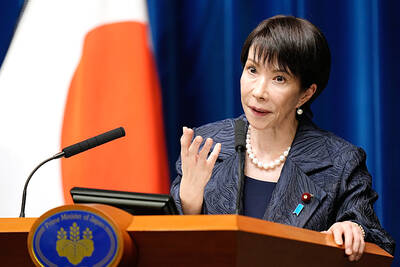There were more than 110,000 overseas students enrolled at Taiwanese universities last year, accounting for 8.27 percent of the nation’s university student population, the Ministry of Education said yesterday.
The number of foreign students rose by 16,537 last year to 110,182, according to ministry statistics.
Department of International and Cross-strait Education section head Liu Su-miao (劉素妙) said last year’s surge “caught us by surprise” and she attributed it mainly to 7,000 more Chinese students.
It also reflected more aggressive recruiting efforts overseas by local universities, which have been hit by declining enrollment by Taiwanese students because of the nation’s low birth rate over the past two decades, Liu said.
The figures also show that the ministry’s objective to increase the number of foreign students from 30,000 in 2008 to more than 100,000 this year had been met.
The government’s aim is to turn Taiwan into an “advanced learning powerhouse” in the Asia-Pacific region, Liu said.
Ministry statistics also showed that the number of foreign students pursuing advanced degrees increased by 6,000 last year.
Foreign students mainly come from Malaysia, China, Hong Kong, Macau and Vietnam, in that order.
There was also a sharp increase in the number of students from India, Indonesia and Myanmar, Liu said, adding that her department expects to further diversify its sources of students in the future and hopes to recruit 150,000 foreign students a year by 2021.
The ministry said that Taiwan has built a reputation for having a friendly learning environment after easing regulations on overseas students, offering more scholarships and promoting a counseling system.
The focus now would be to encourage overseas students to remain in Taiwan to work after graduation and give the nation’s private sector more access to overseas graduates, it said.

The Ministry of Foreign Affairs (MOFA) yesterday voiced dissatisfaction with the Comprehensive and Progressive Agreement for Trans- Pacific Partnership (CPTPP), whose latest meeting, concluded earlier the same day, appeared not to address the country’s application. In a statement, MOFA said the CPTPP commission had "once again failed to fairly process Taiwan’s application," attributing the inaction to the bloc’s "succumbing to political pressure," without elaborating. Taiwan submitted its CPTPP application under the name "Separate Customs Territory of Taiwan, Penghu, Kinmen and Matsu" on Sept. 22, 2021 -- less than a week after China

THE GOOD WORD: More than 100 colleges on both sides of the Pacific will work together to bring students to Taiwan so they can learn Mandarin where it is spoken A total of 102 universities from Taiwan and the US are collaborating in a push to promote Taiwan as the first-choice place to learn Mandarin, with seven Mandarin learning centers stood up in the US to train and support teachers, the Foundation for International Cooperation in Higher Education of Taiwan (FICHET) said. At the annual convention of the American Council on the Teaching of Foreign Languages held over the weekend in New Orleans, Louisiana, a Taiwan Pavilion was jointly run by 17 representative teams from the FICHET, the Overseas Community Affairs Council, the Steering Committee for the Test of Proficiency-Huayu, the

A home-style restaurant opened by a Taiwanese woman in Quezon City in Metro Manila has been featured in the first-ever Michelin Guide honoring exceptional restaurants in the Philippines. The restaurant, Fong Wei Wu (豐味屋), was one of 74 eateries to receive a “Michelin Selected” honor in the guide, while one restaurant received two Michelin stars, eight received one star and 25 were awarded a “Bib Gourmand.” The guide, which was limited to restaurants in Metro Manila and Cebu, was published on Oct. 30. In an interview, Feng Wei Wu’s owner and chef, Linda, said that as a restaurateur in her 60s, receiving an

MORE RETALIATION: China would adopt a long-term pressure strategy to prevent other countries or future prime ministers following in Sanae Takaichi’s steps, an academic said Taiwan should maintain communications with Japan, as Japanese Prime Minister Sanae Takaichi is to lead a revision of security documents, Taiwanese academics said yesterday. Tensions have risen between Japan and China over remarks by Takaichi earlier this month that the use of force against Taiwan would constitute a “survival-threatening situation” for Japan. Prospect Foundation president Lai I-chung (賴怡忠) yesterday said Takaichi’s stance regarding Taiwan is the same as past Japanese prime ministers, but her position is clearer than that of her predecessors Fumio Kishida and Shigeru Ishiba. Although Japan views a “Taiwan contingency” as a “survival-threatening situation,” which would allow its military to